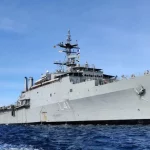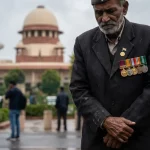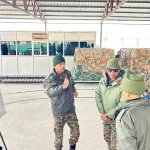In a sweeping strategic breakthrough, France and Ukraine have sealed a landmark defence cooperation agreement in Paris, paving the way for Kyiv to acquire up to 100 Dassault Rafale multirole fighter jets along with drones, radars, and advanced air-defence systems.
The pact—signed by French President Emmanuel Macron and Ukrainian President Volodymyr Zelenskyy—was hailed by both leaders as a “historic agreement” that will fundamentally reshape Ukraine’s future defence capabilities.
A Transformational Deal for Ukraine
The agreement authorises future contracts for Rafale aircraft over the next decade, marking the first time these cutting-edge European fighters have been formally offered to Ukraine. Deliveries will be phased in over ten years, aligned with production capacity and Ukraine’s long-term security planning.
President Macron emphasised France’s enduring support, saying Paris is committed to helping Ukraine rebuild a robust and modern deterrence force capable of preventing future aggression. He confirmed that production of new drones and missile interceptors for Ukraine would begin before year-end.
Calling the current stage of the war “a difficult moment”, Macron sharply criticised Russia’s continued offensives and expressed hope that a path to peace could emerge before the end of his presidential term in 2027.
Strengthening Ukraine’s Airpower
For Kyiv, the Rafale proposal represents a major leap in airpower modernisation. Ukraine has previously secured Swedish Gripen jets under a separate letter of intent, but the Rafale’s inclusion signals deeper interoperability with NATO-standard platforms.
Alongside the aircraft, the agreement includes a broad range of advanced systems:
- Enhanced SAMP-T air-defence systems
- Modern multi-role air-surveillance radars
- Next-generation reconnaissance and strike drones
- Full weapons packages and operational support
Financial arrangements have not been publicly disclosed, though French officials indicated a blend of national funding and joint EU borrowing, a point likely to draw scrutiny from Germany.
Context: Ukraine Under Pressure
Zelenskyy’s latest visit to Paris comes amid escalating battlefield pressure and domestic turmoil. Russian forces have claimed advances in the Kharkiv and Sumy sectors, while renewed missile and drone strikes have resulted in civilian casualties.
At home, Zelenskyy is pushing through a fresh wave of anti-corruption measures, firing ministers and restructuring energy-sector leadership following new graft allegations. While acknowledging that reforms are “not enough”, he reaffirmed Ukraine’s commitment to meeting EU governance benchmarks.
Macron, in turn, reiterated France’s support for Ukraine’s eventual EU membership, praising ongoing reforms but underlining the need for deeper institutional progress.
Broader Strategic Impact
After signing the accord, the two leaders visited Mont Valérien, the site of planned headquarters for a future international stabilisation force to be deployed post-ceasefire in Ukraine. The envisioned force—planned jointly by France and the UK—would help oversee reconstruction and long-term security transitions.
For France, the agreement strengthens its position as Europe’s leading supplier of high-technology defence systems. For Ukraine, it sends a powerful message of international confidence in its endurance and recovery.
Macron summed up the pact bluntly: “Even if peace comes, Ukraine’s defence must never again be in doubt.”
Zelenskyy echoed the sentiment, calling the deal “a historic step that strengthens our defence and secures our future within Europe’s security architecture.”
As winter sets in and battlefield uncertainties mount, the Paris agreement stands as both reassurance and resolve—peace will belong to those strong enough to defend it.













